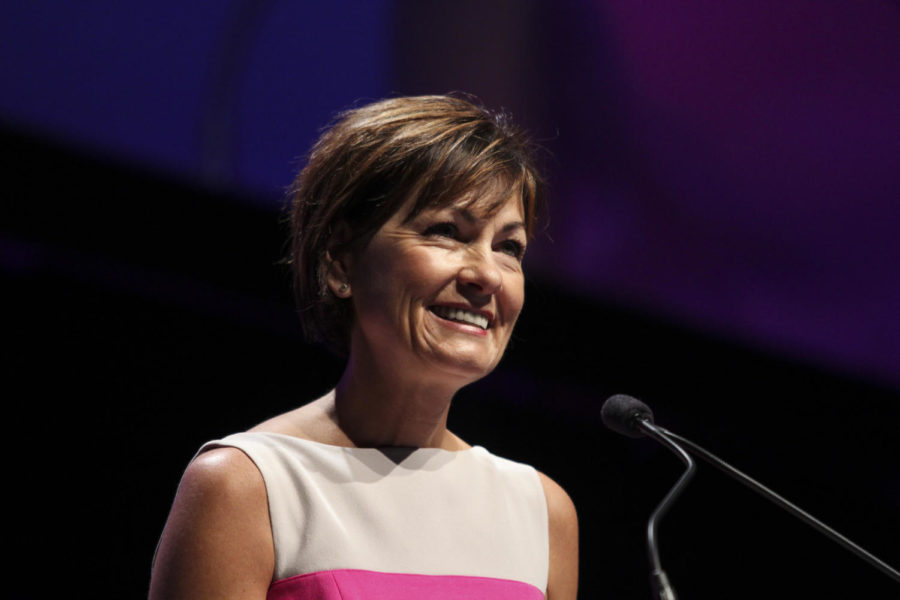Meet the candidates: Kim Reynolds, Republican for governor
Kelby Wingert/Iowa State Daily
Lt. Gov. Kim Reynolds spoke at the 2014 Family Leadership Summit on Aug. 9 at Stephens Auditorium.
October 24, 2018
Kim Reynolds, a fifth generation Iowan and incumbent Republican Governor, is in a close race with her opponent Fred Hubbell to see who the next Governor of Iowa will be.
Reynolds first took office in 2011 as Lieutenant Governor when Gov. Terry Branstad won his election. Reynolds became the first female governor of Iowa when Branstad became ambassador to China in 2017.
As governor, Reynolds oversaw key legislation as it made its way through the legislature including restrictions on the ability of public unions, legalized fireworks, gun legislation, reforms to mental healthcare in Iowa, the “fetal heartbeat bill,” voter ID laws and large scale tax cuts.
Both candidates have narrowed the race to a few key issues.
The economy
Reynolds has said Iowa’s Economy is in a better state than it has been in 10 years with wages rising. She said this is in sharp contrast to the large deficit the state had been in when she and Gov. Terry Branstad took office.
“The budget is balanced, our reserves are full, we have a surplus of $127 million,” said Reynolds at the first of three gubernatorial debates. “We need to let Iowans control more of their hard earned money.”
Reynolds has also talked about unemployment in the state and that jobs in Iowa are at record highs.
David Andersen, assistant professor of political science at Iowa State, said unemployment rates can be an alright indicator of economic health, but there are also a lot of other indicators that go into the overall health of the economy.
“Unemployment rates are a decent indicator on the health of the economy, but we should be consulting other indicators too,” Andersen said. “We’ve been measuring unemployment the same way for decades now, so it is a good measurement to refer to.
“There are some big things it misses, though,” he said. “It doesn’t consider people not looking for work, which is a growing demographic in Iowa. It doesn’t account for stagnant wages, so it’s not seeing people that get two to three jobs to make ends meet.”
This was also reflected by Hubbell during the campaign as he cited a recent report that said nearly 40 percent of Iowans struggle to afford basic necessities.
Mental healthcare
Mental healthcare in Iowa has been one of the main voting issue for Iowans. As such, most of the debates and talking points by either candidates had mental healthcare as a priority.
Reynolds passed signed a bipartisan healthcare reform into law, but she has been criticized for passing a budget that didn’t fund those reforms. She has also been criticized for helping privatize Medicaid in Iowa.
Reynolds said the current system in Iowa has been working better than the old system, calling it “irreversible” and “unstable.” She said the current system, with the help of managed care organizations (MCO), has been helping Iowans get the care they need, and she told Hubbell he didn’t have an alternative plan to pay for healthcare.
“Are there areas we can do better, absolutely,” Reynolds said. “But it starts with making sure we have the money needed in the system. You’re just talking about everything people want to hear. You’re not talking about how you’re going to fund the [Medicaid] system going forward.”
Taxes
Reynolds has also focused a large amount of her time saying Hubbell would work to change economic growth by raising taxes. She said he would not support job growth and keeps promising people “money, money, money” without any way to get that money.
“We don’t print money in this state,” Reynolds said.
Hubbell’s response to this throughout the campaign has been that a recent budget surplus is due to fiscal irresponsibility and a slew of mid-year cuts to education, healthcare and infrastructure spending in the state.
Hubbell has also said he would only take away tax cuts and credits to the most wealthy in Iowa, but Reynolds doesn’t buy this.
“I want to reduce taxes, he wants to raise them,” Reynolds said. “He has made that very clear.”
Reynolds attacks on Hubbell
Reynolds has had multiple attacks on Hubbell throughout the campaign. She has criticized him for not releasing the full extent of his tax returns and she had said his views on tax credits is hypocritical.
Reynolds said Hubbell and his family had taken advantage of tax credits he said he opposes. Calling Hubbell a “hypocrite,” Reynolds argued her opponent was being disingenuous and lacked a clear message at the second debate and that Hubbell had even helped form some of the tax credits still in place today.
Hubbell disagreed, saying there had been no foul play in the past as he had gone through all of the proper procedures when he was in charge of a tax credit review board.







